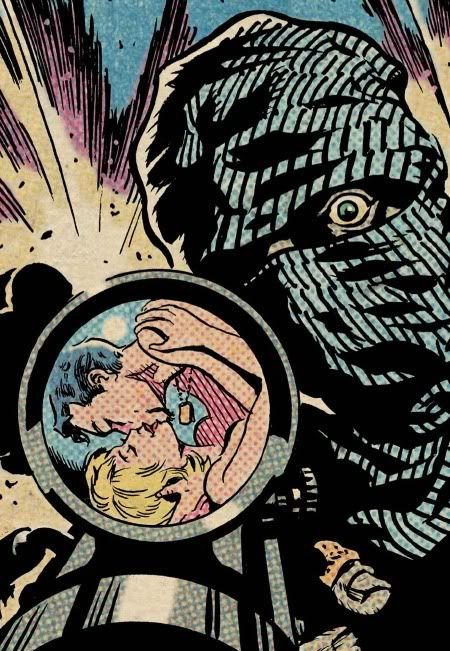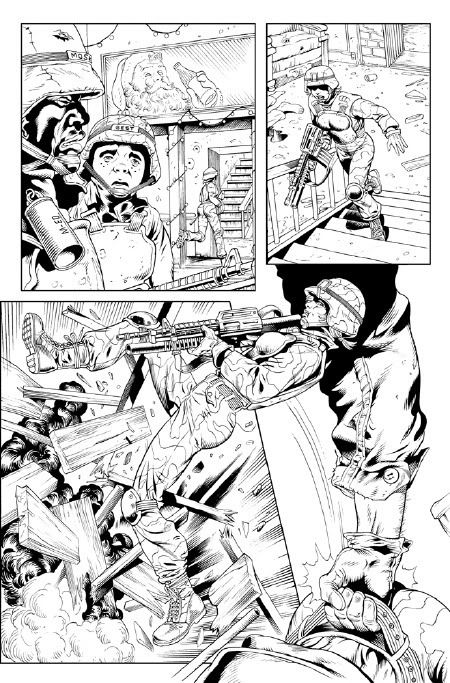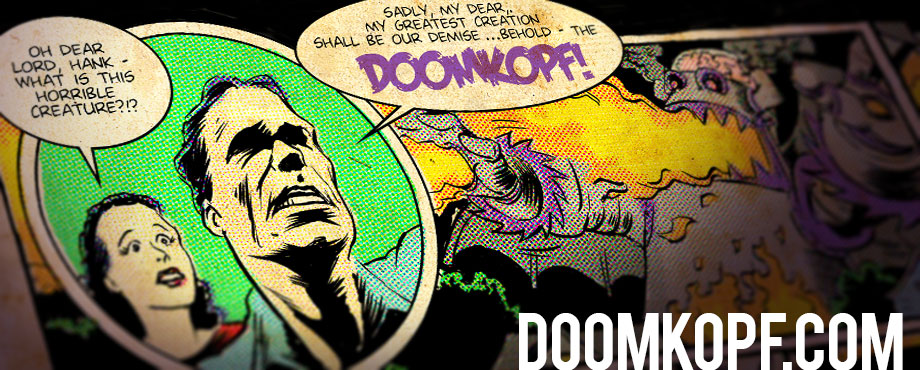Q&A: Rick Veitch
Following up on yesterday’s preview of Army@Love #1 (in stores tomorrow), we’re excited to give you a look into the thoughts of the book’s creator, Rick Veitch. A writer and artist who’s done superheroes, Swamp Thing and dream journals over his career, Veitch has focused much of his attention lately on the landscape of America in these war years. He had a lot to say on the matter and about his latest book. So, without further ado, Rick Veitch:
Jean-Claude Van Doom: First, how did this project start developing? From the first issue, it seems like the kind of story that could almost spark from just a quick thought, or a piece of a news report.
 Rick Veitch: Like just about everything I’ve done, I’m coming at ARMY@LOVE from a couple different directions. The obvious one is the socio-political situation we find ourselves struggling with these days. That’s something you’ll see that in the plot set-up of this series, which satirically imagines what the current war will look like five years in the future. Along with that there is the human dimension; the psycho-sexual-spiritual qualities of modern life that the characters hopefully come to embody.
Rick Veitch: Like just about everything I’ve done, I’m coming at ARMY@LOVE from a couple different directions. The obvious one is the socio-political situation we find ourselves struggling with these days. That’s something you’ll see that in the plot set-up of this series, which satirically imagines what the current war will look like five years in the future. Along with that there is the human dimension; the psycho-sexual-spiritual qualities of modern life that the characters hopefully come to embody.
For me, character creation and development is an intuitive process, and I’m happy to report the extensive ARMY@LOVE ensemble has come alive in my head and are dictating their dialogue and parts. The third foundational element is the form itself. Like the title suggests, ARMY@LOVE mashes up two comic-book genres, the war comic and the love comic. What I find interesting about these two genres is how they both still embody a sort of simple, Roy Lichtenstein approach to panel art. I mean, Sgt. Rock only exists on the battlefield; he never agonizes over breaking up with his girlfriend. While love comics traditionally avoided any kind of meaningful social commentary. I’m trying to expand and explode them both in ARMY@LOVE.
JCVD: I don’t know if I interpreted the first issue right, or if the message of the series changes as it goes along, but what struck me was that you didn’t seem to make any direct moral statements about the wars in Iraq and Afghanistan. Maybe a better way to put it was that the story seemed to focus on the individual morality of the soldiers, rather than the war in general. What do you see as the message of the book?
 RV: The characters always have to be out in front, with the “message” (if that’s what we must call it) serving as a motivational and defining backdrop. In this case, I’m looking at the situation we’ve got ourselves into in Iraq and imagining what comes next. Everyone seems to be thinking we are going to pull out in a year or two, but as sad as I am to say it, I don’t believe that is going to be the case. I suspect we are in for a decades-long conflict all across the middle east and southern Asia. ARMY@LOVE imagines how the powers that be might have to rebrand such an unpopular war, in much the same way consumer products are routinely rebranded, to keep it going. The second issue explains this in a lot more depth, introducing the idea of the “corporate draft”, while the whole satirical approach to marketing and funding war expands over the length and breadth of the series.
RV: The characters always have to be out in front, with the “message” (if that’s what we must call it) serving as a motivational and defining backdrop. In this case, I’m looking at the situation we’ve got ourselves into in Iraq and imagining what comes next. Everyone seems to be thinking we are going to pull out in a year or two, but as sad as I am to say it, I don’t believe that is going to be the case. I suspect we are in for a decades-long conflict all across the middle east and southern Asia. ARMY@LOVE imagines how the powers that be might have to rebrand such an unpopular war, in much the same way consumer products are routinely rebranded, to keep it going. The second issue explains this in a lot more depth, introducing the idea of the “corporate draft”, while the whole satirical approach to marketing and funding war expands over the length and breadth of the series.
JCVD: Throughout the first issue, the book was always bouncing between the extremes of love (usually physical) and violence. The title also reinforces that point. What’s the relationship between those two elements?
RV: I see sexuality as an underlying element of the clash of civilizations we seem to be experiencing. The libertine culture of the west is in direct conflict with the conservative Muslim approach to sexuality. We’re flooding the world, via television and movies, with the idea that hyper sexuality is something to be promoted from an early age while a billion Muslims exist in a strict religious belief system that is right out of the middle ages. They see us as corrupting and we see them as repressed. This isn’t discussed a lot when pundits analyze the war, but I think it plays a big role in what motivates people to fight, especially when it comes to the suicide bombers.
JCVD: Was it your intent to make both the scenes of love (or lust, perhaps) and violence almost cartoony? There are graphic elements, but they seem to be treated in a sort of carefree way.
Going back and reading the histories of the world wars you find that when faced with mass carnage, like in the trenches or the invasion of France, human beings shut down their ability to feel empathy, probably as a survival mechanism. Fictionalized war films and comics almost never deal with this aspect of combat, instead focusing on characters who are in a state of constant heartbreak and tragedy. So, I’m trying to break the mold a little bit here.
JCVD: How soon will you get into the mystery of the husband? I really enjoyed the subtle things he said and the gun tucked in the waistband, hinting at a lot more to come.
RV: I think Loman is really the best character in the series. He’s a low level bagman, running money for businesses making a killing on the black market. He’s a sociopath though, compulsively stealing from everyone he works with and for. So he’s always making enemies and always trying to weasel his way out of tight situations. But at the same time he’s got a sort of noble approach to the women he is in relationships with. He’s definitely someone to watch.
JCVD: Where did you come up with the idea of the song about the speedboat that runs throughout the issue? I took it as a riff on the banality of pop music, but I know I probably missed a deeper relevance.
RV: Actually, I had a real song that opened the first issue, but they asked me to change it for legal and financial reasons. So I made up my own lyric and, yes, its a riff on banality. But it keeps coming back in future issues, sort of like those old Jack Benny shows that revisit the same gag over and over.
JCVD: How important have current events been in shaping the book?
 RV: As a satire on current events, obviously what’s going on right now is important. But ARMY@LOVE is also a fantasy about the future, so I’m researching some of the weapons systems in the current pipeline and extrapolating on them. War tends to fund a lot of R&D and some of the stuff you read about under development is pretty amazing and/or horrific.
RV: As a satire on current events, obviously what’s going on right now is important. But ARMY@LOVE is also a fantasy about the future, so I’m researching some of the weapons systems in the current pipeline and extrapolating on them. War tends to fund a lot of R&D and some of the stuff you read about under development is pretty amazing and/or horrific.
JCVD: Coming after Can’t Get No, it seems pretty clear that you’re interested in using comics to spread a message about what’s going on in America and, more specifically, the way that Americans are reacting to the big events of the day. What’s wrong with America and Americans?
RV: First, I’d have to say there are a lot of things that are right with America. Freedom of speech, freedom of religion, economic and educational opportunity are nothing to be sniffed at and obviously not universal across the globe. But it does scare me that we Americans allowed ourselves to be stampeded into a ruinous war like Iraq. It seems to me that the nature of political discourse has changed considerably over the last couple decades. When I talk to people, few of them seem to be reading about current events, and instead are getting their information from television, talk radio or the internet which all operate on an emotional basis rather than as a function of reason and intellect.
Politics and international relations seem to have devolved for too many Americans to the simplistic level of a sports event. A lot of once-intelligent minds seem closed to the evolution of ideas and focused only on whether their side is winning the latest skirmish in the culture wars. I believe if we wish to keep the democratic freedoms we enjoy we need to act as responsible citizens by educating ourselves to reality. The first step is breaking the hypnotic spell of electronic media, which right now plays to the worst side of what it means to be human.
JCVD: After Can’t Get No and now Army@love, how’s the relationship with Vertigo? Have they been a good fit?
RV: It’s been a great fit. Considering my early work on SWAMP THING, I guess a little bit of my DNA got in the mix of what Karen Berger ultimately cooked up as Vertigo. The current business climate of comics almost requires that a creator align themselves with one of the majors if they want their books to have a chance in the marketplace. I don’t see any big publisher, other than Vertigo, that would get behind something as challenging as CAN’T GET NO or as cutting edge and politically charged as ARMY@LOVE. I’m in a fortunate position, as well, because I also have my own self-publishing imprint, KING HELL PRESS. I keep an extensive backlist of my books in print, like BRAT PACK, THE MAXIMORTAL, THE ONE and my dream comics. I released a graphic novel, ABRAXAS AND THE EARTHMAN last year and have a collection of my short stories titled SHINY BEASTS coming out in April.
I’ve learned that by timing my King Hell releases to follow something from Vertigo, I’m able to catch that wave of promotion and reader interest that only major publishers can generate. So, for me, its been a win-win situation.
And that’s Rick Veitch. Many thanks to him for taking the time to share some thoughts and give readers a look inside his work.
